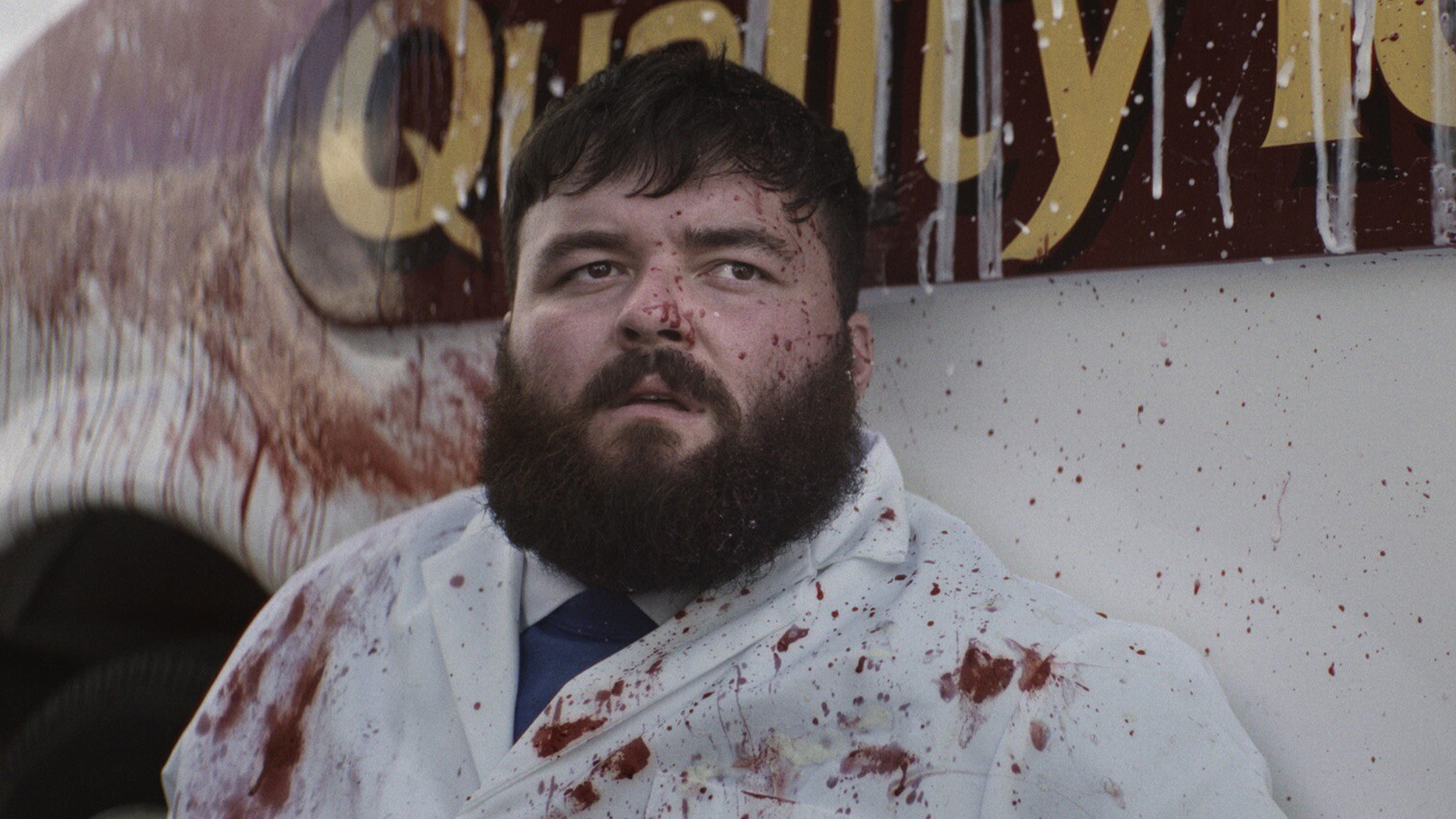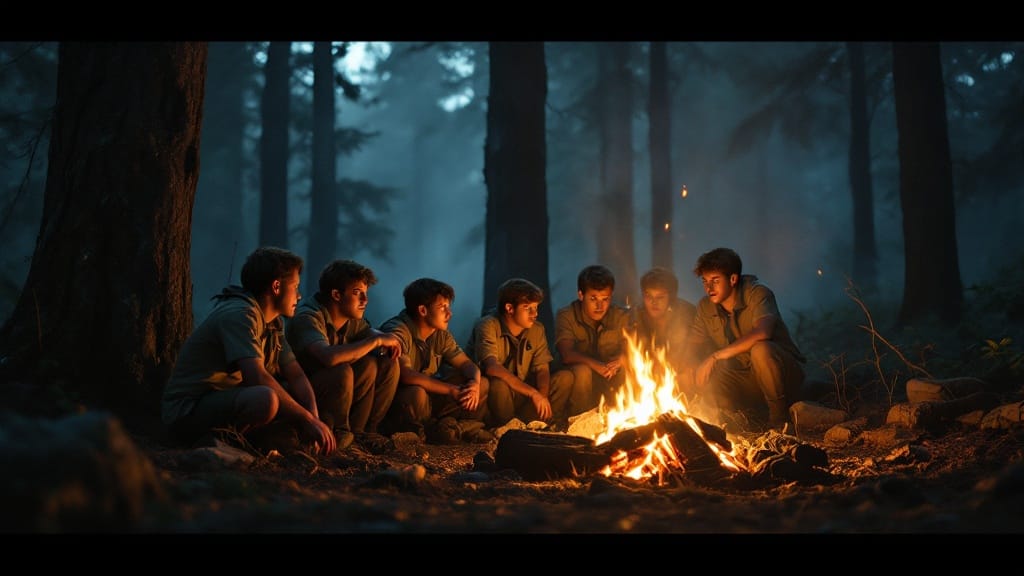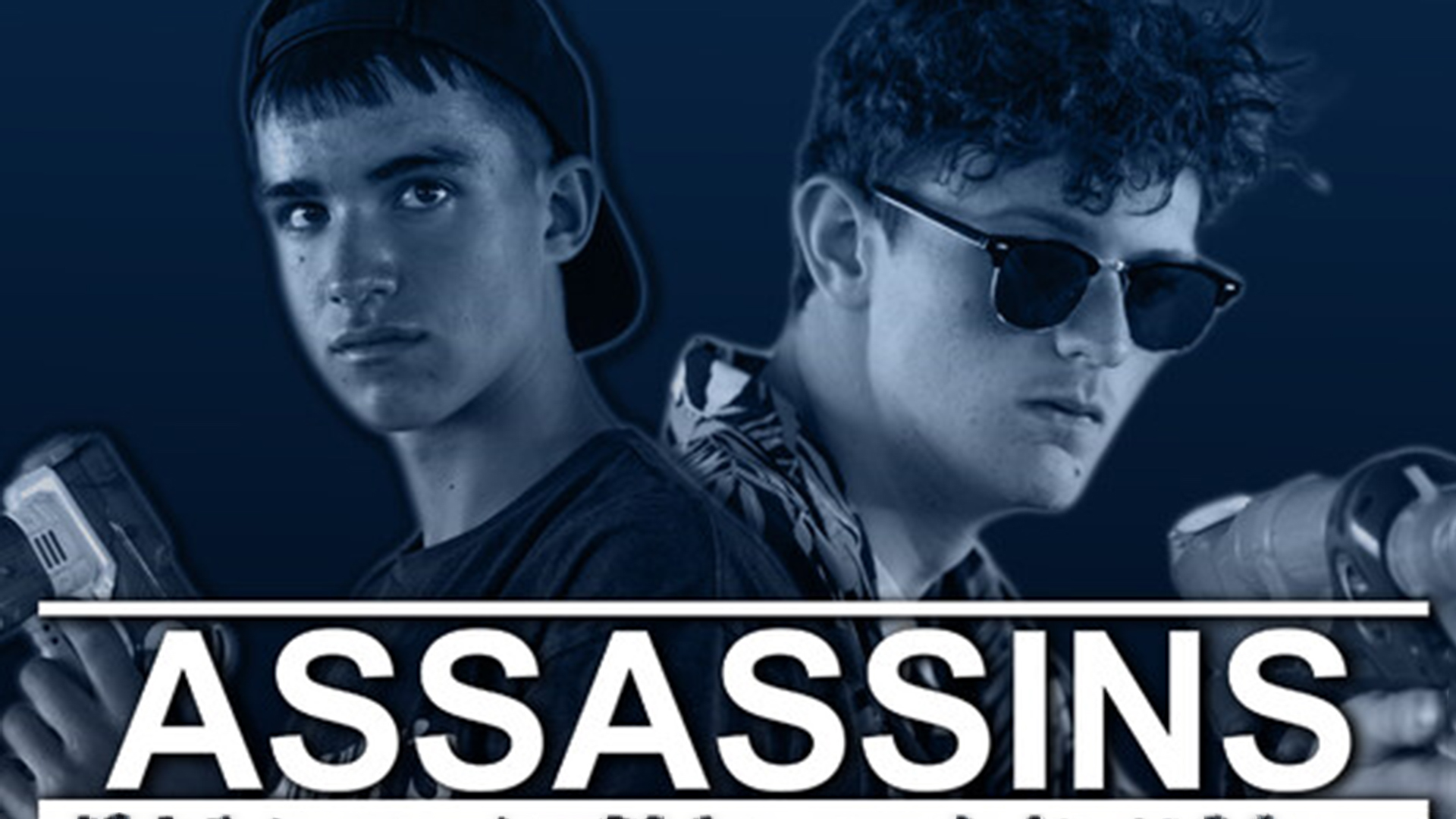Comedy
Whippy

Directed by James Rooke
Warning – This review may contain spoilers.
Whippy is set in 1980s Glasgow, where an absurd yet entertaining turf war erupts between rival ice cream vendors. What begins as a seemingly lighthearted dispute over territory escalates into a full-blown standoff, with the vendors clashing over frozen treats as though they were engaged in a serious crime drama. The film satirizes the cutthroat competition that mirrors the style of gangland warfare, with its central theme revolving around rivalry, greed, and calippos—turning what could have been a mundane scenario into a highly engaging story. The juxtaposition of a grim atmosphere with something as innocent as ice cream provides a refreshing comedic twist that makes the short film both original and humorous.
The film’s strength lies in its ability to play its serious tone against the comedic absurdity of the situation. The dialogue between the actors stands out, as it delivers with a gravity that contrasts the ridiculousness of the turf war over ice cream, adding to the overall charm of the film. The lead actor’s performance is particularly noteworthy, and the chemistry between the characters makes the situation feel both believable and outlandish at the same time. The pacing is fast and engaging, though the short ends on a bit of a cliffhanger, leaving the audience wanting to see more of how the situation unfolds. This leaves viewers intrigued but also wishing for a more complete resolution. Overall, audiences are bound to appreciate Whippy’s satirical tone and witty dialogue, enjoying how the film transforms a simple premise into something memorable and fun.
Whippy excels in its production value. The cinematography is well-executed, with framing and shot composition that keep the film visually interesting without feeling awkward or forced. Notable moments include the landscape shots, such as the truck’s entrance and the girl on the swing, which contribute to the film’s tone and atmosphere. The use of close-ups during character interactions adds a level of tension that mimics crime dramas, creating a contrast between the intensity of the scene and the lighthearted subject matter.
The sound design is another standout feature. The crisp sound effects, such as the crunching of ice cream wrappers and the hum of the trucks, enhance the viewing experience, while the score adds an extra layer of suspense, lending the film a serious tone despite its humorous plot. The lighting, even in outdoor scenes, is consistent and natural, contributing to the overall professionalism of the production. The editing also shines, with a smooth and effective flow that helps keep the narrative tight and engaging.
With over 15 years of experience in production and art direction, James Rooke has earned recognition in the world of commercials, with his work being highlighted at prestigious events like Cannes and The British Arrows. His background in art direction has significantly influenced his approach to creating striking, memorable visuals, while his passion for writing has driven his storytelling. These experiences have culminated in Whippy, where Rooke blends humor with visual craftsmanship to create a story that connects with audiences on multiple levels. In this film, he brings humor to the often-bleak narrative of 1980s Britain, using a turf war over ice cream as a vehicle for his unique, well-crafted storytelling.
Comedy
Troop 458

WARNING! This review contains SPOILERS!
Troop 458, written by Trevor Allen, captures the often daunting, yet transformative, experience of being the new kid in a world full of unknowns. We follow Sidney, an anxious boy thrown into his first Boy Scouts campout, where he faces both the perils of acceptance and the strangeness of his eccentric scout leader. As spooky campfire tales start to weave into reality, Sidney is forced to confront his fears head-on, finding moments of humor, adventure, and unexpected camaraderie along the way.
I like the concept of Troop 458 because it blends coming-of-age themes with a playful sense of adventure, all wrapped in an atmosphere tinged with just the right amount of mystery. Allen’s writing brings to life a cast of memorable characters, especially through Sidney’s journey of growth. The tension between humor and fear feels authentic to the Boy Scouts’ setting, and it captures the real challenges kids face when trying to fit in.
What resonated with me most was the screenplay’s exploration of courage—not just in facing mythical dangers but in embracing who you are, quirks and all. Some aspects could benefit from a clearer focus on character motivations and tighter pacing to keep the momentum strong, particularly during scenes that blur the line between myth and reality.
The dialogue is great in many places, offering humor that feels natural for a group of young scouts. There were moments where I felt the conversations could be a bit sharper or more distinct to heighten the comedic or emotional impact. Character development is a strong suit, with Sidney’s evolution being both relatable and satisfying, but secondary characters could have a bit more depth to elevate the ensemble.
Allen’s Troop 458 is polished, with solid grammar, spelling, and formatting that adhere to professional standards. The structure is clean and makes for an easy read, setting up scenes that are visually compelling.
Troop 458 delivers an enjoyable mix of humor, heart, and a touch of the supernatural, leaving me eager to see how it might come to life on screen.
Comedy
Game Night

Directed by Carston Hadlock and Alex Howard
Warning – This review contains spoilers.
Game Night brings a fun and lighthearted take on a high-stakes poker game that quickly spirals into chaos. The film follows two players as they engage in an increasingly absurd battle, pulling in cards from different games to outsmart one another. I found the playful banter and surprise twists to be entertaining with the film’s simple concept working well within its short runtime. The escalating nature of the game kept the energy high and I thought the twist at the end was a clever and humorous touch that left me smiling.
The story is easy to follow, though it’s more about the journey than the destination. The back-and-forth between the two players keeps the tension alive, with each of them raising the stakes by introducing cards from other games into the mix. The comedic timing in the editing really sold these moments, as the quick cuts and dramatic delivery from the actors added an extra layer of humor to the film. The characters themselves were fun to watch, especially in how seriously they approached the absurdity of their escalating card game. It may not be the most relatable film for someone who isn’t familiar with card games, but the humor and pacing make it enjoyable for a broader audience.
Game Night has some standout technical elements. The sound design effectively complements the fast-paced nature of the film, adding a sense of urgency that drives the scenes forward. While the lighting was generally well done, there were a few close-ups that felt slightly out of focus, and in some wider shots, the composition wasn’t as strong—the focus seemed to drift to a case of poker chips rather than the characters themselves. Still, the fun angles and creative shot choices helped maintain visual interest throughout. The score is dramatic and slightly over-the-top, but it works well within the style of the film, enhancing the comedic tone.
The film also uses close-up shots effectively, adding intensity to the card-playing moments, which helped build the sense that something serious (and yet hilariously inconsequential) was happening. While the sound was mostly solid, I did notice some background room tone cutting out at times, which was a bit distracting. However, the overall editing did a great job of pacing the film, keeping it flowing smoothly from one comedic beat to the next without any jarring moments.
Game Night is a fun, lighthearted short that doesn’t take itself too seriously, and that’s precisely what makes it work. The film has a clear sense of humor, and while the stakes may not be high in the grand scheme of things, the playful twist at the end adds a memorable conclusion. Audiences looking for a quick, entertaining watch will likely enjoy the film’s humor and energy.
Action
Assassins

Directed by Carston Hadlock
Warning – This review contains spoilers.
Assassins delivers a fun and energetic look into a high-stakes game that pits friends against each other in a battle of strategy and wit. As the number of players dwindles, the tension ramps up, and the game becomes increasingly intense. I found the film entertaining, especially with its playful use of classic action film tropes like slow-motion shots and chase sequences. It’s a simple concept but the execution made it enjoyable with plenty of humor sprinkled throughout.
The film has good pacing and the story is easy to follow. We’re thrown into the heart of the action from the beginning with assassins attempting to outsmart each other as they vie to be the last one standing. I appreciated how the film used the cinematography to enhance the chase scenes, especially the dynamic shots of cars pursuing assassins and the camera following them across fields. It added an action-packed vibe to what could have been a straightforward water gun tournament. The use of slo-mo during key moments also gave the film a lighthearted, almost parody-like feel, which worked well with the tone.
From a technical point of view, Assassins has its ups and downs. The lighting was inconsistent, especially in the darker scenes where it became a bit hard to see the action. However, it wasn’t a major issue throughout the film. The sound was clear for the most part, though there was a slight echo in some dialogue, but it didn’t detract much from the experience. The editing flowed smoothly, keeping the film’s pacing tight without feeling rushed, and the action scenes were cut together in a way that maintained the intensity of the game.
Assassins was undeniably fun to watch. There’s a playful nostalgia to it, reminding me of the competitive spirit of water gun fights and games from childhood. It taps into that lighthearted, competitive energy, which is likely to resonate with audiences looking for something that’s both comedic and action-packed.
Assassins offers an enjoyable mix of action and comedy, creating an engaging story from a simple water gun game. Its creative use of cinematography, especially during chase sequences, keeps the energy high, and while the lighting and sound could be improved in places, the overall execution is solid. Audiences who enjoy light-hearted action shorts with a comedic twist will likely appreciate this fun and entertaining film.










